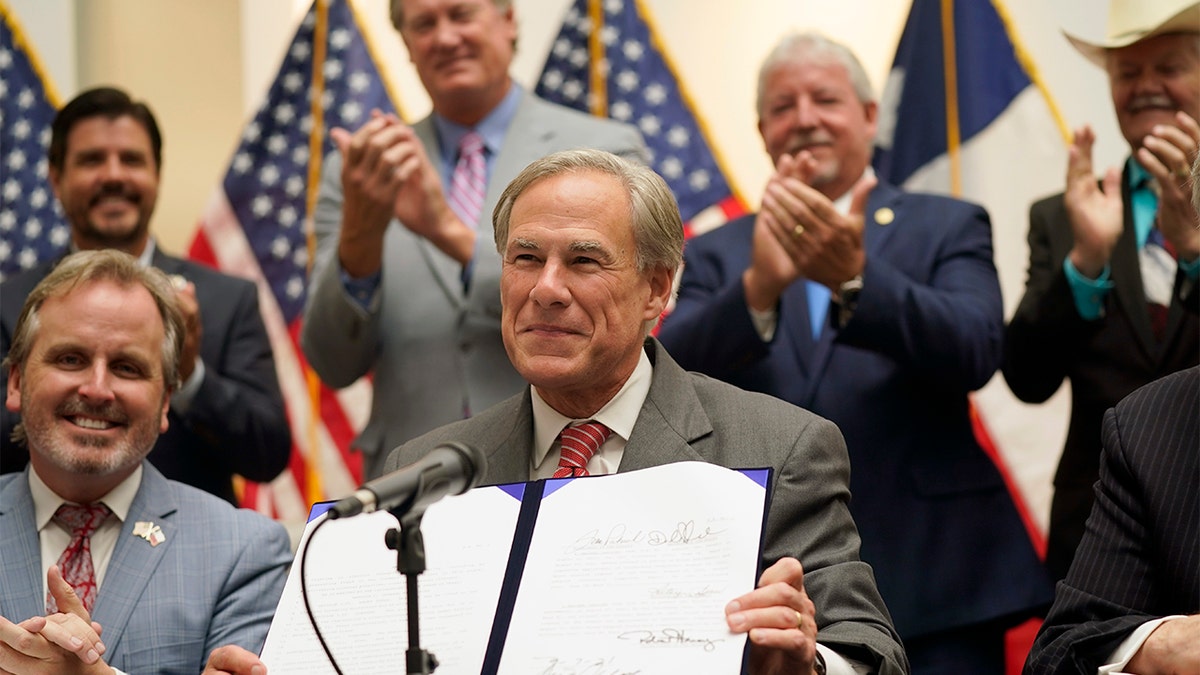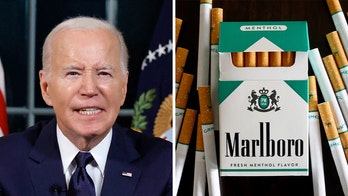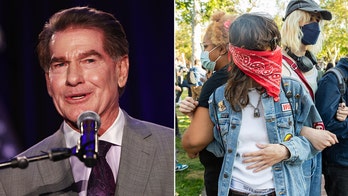Fox News Flash top headlines for September 8
Fox News Flash top headlines are here. Check out what's clicking on Foxnews.com.
Texas Gov. Greg Abbott signed a controversial election security law on Tuesday, marking the culmination of a months-long political battle and a major victory for Republicans in the state who say it will help protect the integrity of future elections.
But Democrats remain dedicated to fighting the law, with several groups filing lawsuits against it and Texas Democratic officials calling on Congress to pass two bills that would essentially override the Texas law with new federal rules.
They allege that the Texas law will suppress minority votes and is meant to cement the GOP's political advantage in the state.
Here's what's in the legislation that some Democrats have compared to Jim Crow laws.
Poll watchers
Following controversy in the 2020 presidential election in some states about whether party-affiliated poll watchers were able to effectively observe the conduct of the election, the Texas law codifies what poll watchers will be allowed to access. It says that watchers should be able to "see or hear" any activity happening in the polling place, including any conversations among election officials.

Texas Gov Greg Abbott shows off Senate Bill 1, also known as the election integrity bill, after he signed it into law in Tyler, Texas, Tuesday, Sept. 7, 2021. The sweeping bill signed Tuesday by the two-term Republican governor further tightens Texas' strict voting laws. (AP Photo/LM Otero) (AP Photo/LM Otero)
DEMS HIT BACK AGAINST TEXAS ELECTIONS LAW WITH FLOOD OF LAWSUITS MINUTES AFTER ABBOTT SIGNS IT
The law explicitly says that poll watchers may observe the closing of the polling place and that they may observe and follow the transfer of any data or other election materials like ballots to places where votes are being counted. It also explicitly bans election officials from "any action to obstruct the view of a watcher or distance the watcher from the activity or procedure to be observed in a manner that would make observation not reasonably effective."
The poll watchers will be required to take an online training and to affirm "that I will not disrupt the voting process or harass voters in the discharge of my duties." They are also specifically banned from watching voters cast their ballots in booths.
Mail ballot voter ID
The Texas law contains a provision – similar to the controversial Georgia election law passed earlier this year – requiring voter ID for people casting mail ballots, rather than just signature verification. But also like the Georgia law, the Texas law includes a litany of workarounds for people who might not have IDs or cannot get one.
According to the law, voters returning mail ballots in person will have to provide their ID to the clerk. Acceptable forms of voter ID include driver's licenses, passports, government documents that show the voter's name and address, a copy of a utility bill, a paycheck, a bank statement, a birth certificate and a handful of other assorted photo IDs.
Voters returning mail ballots through the mail can use their driver's license numbers, election ID certificate numbers or the number of their personal ID card, which is issued by the Texas Department of Public Safety. The election ID certificates are free.
TEXAS GOV. GREG ABBOTT SIGNS CONTROVERSIAL ELECTION INTEGRITY BILL
Alternatively, voters returning mail ballots may also include the final four digits of their Social Security numbers, or the voter can affirm that they have not been issued any of the above documents and still vote.
Ballot harvesting
The Texas law also address concerns about "ballot harvesting," which is practice by partisan operatives of gathering dozens, hundreds or even thousands of mail ballots from voters who they think are likely to vote for their preferred candidate and returning them in person. These individuals sometimes even help voters fill out their mail ballots.
Republicans often raise concerns that this practice creates an opportunity for fraud by unscrupulous individuals who may take advantage of vulnerable people, particularly the elderly. Democrats, meanwhile, say banning the practice simply erects yet another hurdle to people who want to vote but need help to mail or return their ballots.
The Texas law specifically makes paid "vote harvesting services" illegal. It defines this term as "in-person interaction with one or more voters, in the physical presence of an official ballot or a ballot voted by mail, intended to deliver votes for a specific candidate or measure."
The law, however, explicitly exempts unpaid vote harvesting efforts and efforts to collect and return mail ballots that aren't motivated to "deliver votes for or against a specific measure or candidate."
A separate section of the law also contains a provision requiring individuals who provide in-person voting assistance to seven or more people to sign a form.
LIBERAL 'VIEW' HOSTS RAIL AGAINST TEXAS ABORTION LAW: 'IT'S INSANE'
Election lawsuits
The law adds additional procedural guidance for courts handling election-related lawsuits. Notably, it requires courts to prioritize election litigation over all other matters except for death penalty cases.
Voter rolls
The bill requires the secretary of state to work with the Department of Public Safety to compare information on citizenship status in that agency's database to the voter rolls. The checks are required to be "monthly."
Drive-thru voting
A relatively common coronavirus mitigation measure during the 2020 election was drive-thru voting in which voters could cast the equivalent of in-person ballots by voting early from their cars. This was popular in Houston, a blue-leaning area, and led to at least one lawsuit by Republicans against the practice, which they lost.
But assuming the Texas law withstands legal challenges, drive-thru voting in Texas is no more.
"No voter may cast a vote from inside a motor vehicle," unless that voter is disabled, the law says.
24-hour voting ban
In another apparent broadside against Houston's voting procedures, the Texas law bans 24-hour polling places, which county officials in the Houston area established last year.
"[V]oting may not be conducted earlier than 6 a.m. or later than 10 p.m.," the law says.
Mail ballot applications
The Texas law bans the state from sending out mail ballot applications to people who did not request them from election officials.
CLICK HERE TO GET THE FOX NEWS APP
This policy follows controversy from the 2020 presidential election, when many left-leaning states sent unsolicited mail ballots to voters. Those ballots were often sent to the wrong people thanks to outdated or inaccurate voter rolls, which led to concerns that those ballots could be an easy target for fraud.
Republicans nearly universally condemned the practice. But the Texas law goes a step further and bans the mere sending out of mail ballot applications. Some GOP-led states – like Maryland and its moderate Republican Gov. Larry Hogan – embraced that practice as a compromise to increase the accessibility of mail voting while leaving the extra step in the process of sending in the ballot application as a safeguard against fraud.
But the Texas law will not allow that.
"[A]n officer or employee of this state or of a political subdivision of this state may not distribute an application form for an early voting ballot to a person who did not request an application," it says. "An officer or employee of this state or of a political subdivision of this state may not use public funds to facilitate the distribution by another person of an application form for an early voting ballot to a person who did not request an application."
The law does, however, permit candidates and political parties to distribute mail ballot applications to people who did not request one.






